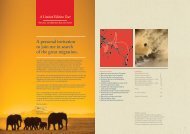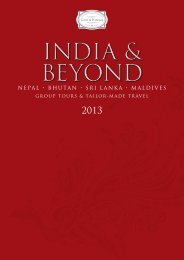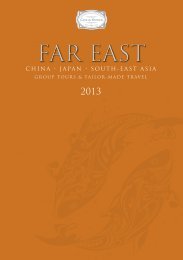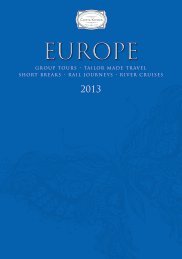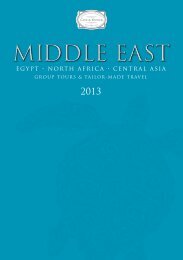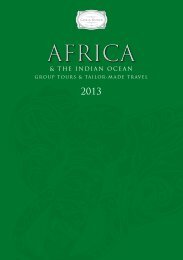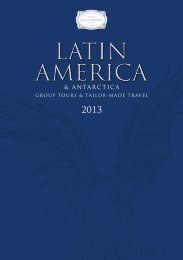africa - Travel Club Elite
africa - Travel Club Elite
africa - Travel Club Elite
Create successful ePaper yourself
Turn your PDF publications into a flip-book with our unique Google optimized e-Paper software.
126 South Africa h Earthwatch h volunteering<br />
call 01306 871187 / www.kuoni.co.uk / see your travel agent<br />
1<br />
Earthwatch - Volunteering in South Africa<br />
South Africa is an ideal<br />
volunteering destination to enjoy one of<br />
Earthwatch’s expeditions,<br />
with opportunities<br />
involving the study of South Africa’s penguin<br />
colonies and the leopards and primates of the<br />
Soutpansberg Mountain Range. Tasks will<br />
range from observing behaviour, collecting<br />
GPS data to trialling revolutionary new<br />
technology as well as helping the scientists with<br />
various other tasks.<br />
Living Alongside Leopards and<br />
Monkeys in South Africa<br />
expedition duration: 11 nights<br />
THE MISSION<br />
To shift negative perceptions of leopards and to minimise<br />
the conflict between them and humans through an increased<br />
understanding of the ecology of the species and through<br />
broader analysis of carnivore diets. There is also a need<br />
to monitor predator populations within the Soutpansberg<br />
Mountains, to ensure that human activities are not having a<br />
detrimental effect on the numbers found in the area.<br />
There is also a focus on primates as they are often cited<br />
as a disruptive pest as, due to their intelligence, they are<br />
quick to take advantage of crops and other human food<br />
sources causing frustration for local farmers. The team<br />
study three types of primates – chacma baboons, vervet<br />
monkeys and samango monkeys and as they habituate to<br />
the close proximity of researchers quickly, they are able to<br />
observe them closely. An important aspect of the work is to<br />
understand how and why these conflicts between primates<br />
and humans come about and to examine ways we can help<br />
live in harmony.<br />
A TYPICAL DAY<br />
Below is a taste of what a typical day as a volunteer on<br />
the Living Alongside Leopards and Monkeys in South<br />
Africa programme may be like. Be aware that each day is<br />
different, and activities will change due to weather, work<br />
conditions and project demands. Volunteers usually have<br />
one recreational day per week.<br />
7:00 am - Breakfast<br />
8:00 am - Briefing on the day’s activities by the<br />
research staff<br />
8:30 am - Depart either on foot or by vehicle and visit a<br />
number of camera trap stations or tracks for scat samples<br />
12:30 pm - Lunch<br />
2.00 pm - At wilderness camp, either downloading and<br />
processing the information from the cameras or filtering<br />
and processing scat at the research centre. Volunteers may<br />
be involved in data collection and monitoring vegetation<br />
plots for primate food availability.<br />
7:00 pm - Dinner<br />
After dinner - Talks from the research staff or time<br />
for relaxation.<br />
guide price<br />
from<br />
£1995 per person<br />
Guide price includes accommodation, all meals, transfers and expedition<br />
itinerary as detailed but excludes international flights.






